What We Measure
What We Measure

9 Key Performance Indicators
Your Teamlytica report gives you and your team a breakdown of each of the major nine categories within the report. All are colour-coded for ease of use.
The nine categories we score against are based on acknowledged academic, management and team diagnostics. Each question is carefully worded to ensure it can be answered by anyone completing the survey.
Each question is answered via a sliding scale of 1-10 – from ‘Never’ to ‘Always’. Each of the questions and categories are interlinked and interdependent and produce a clear and thorough diagnosis of where the team is ‘at’.

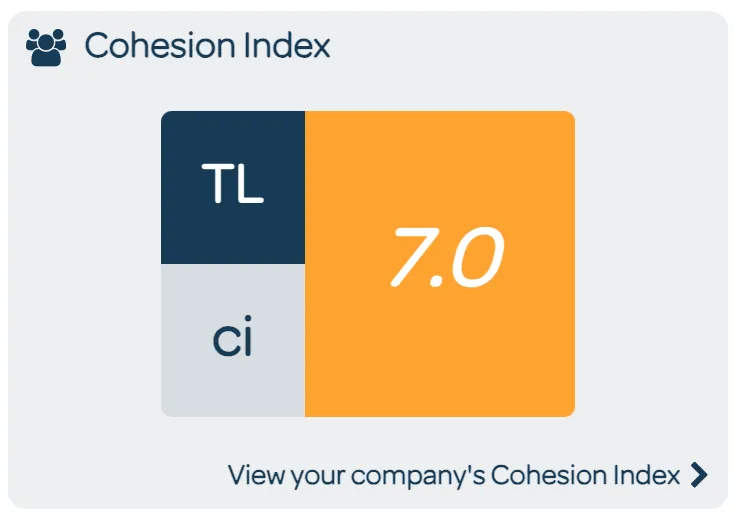
Team Cohesion
Team Cohesion
Your Teamlytica report gives you and your team a breakdown of each of the major nine categories within the report. All are colour-coded for ease of use.
The nine categories we score against are based around acknowledged academic, management and team diagnostics. Each question is carefully worded to ensure it can be answered by anyone completing the survey.
Each question is answered via a sliding scale of 1-10 – from ‘Never’ to ‘Always’. Each of the questions and categories are interlinked and inter-dependent and produce a clear and thorough diagnosis of where the team is ‘at’.
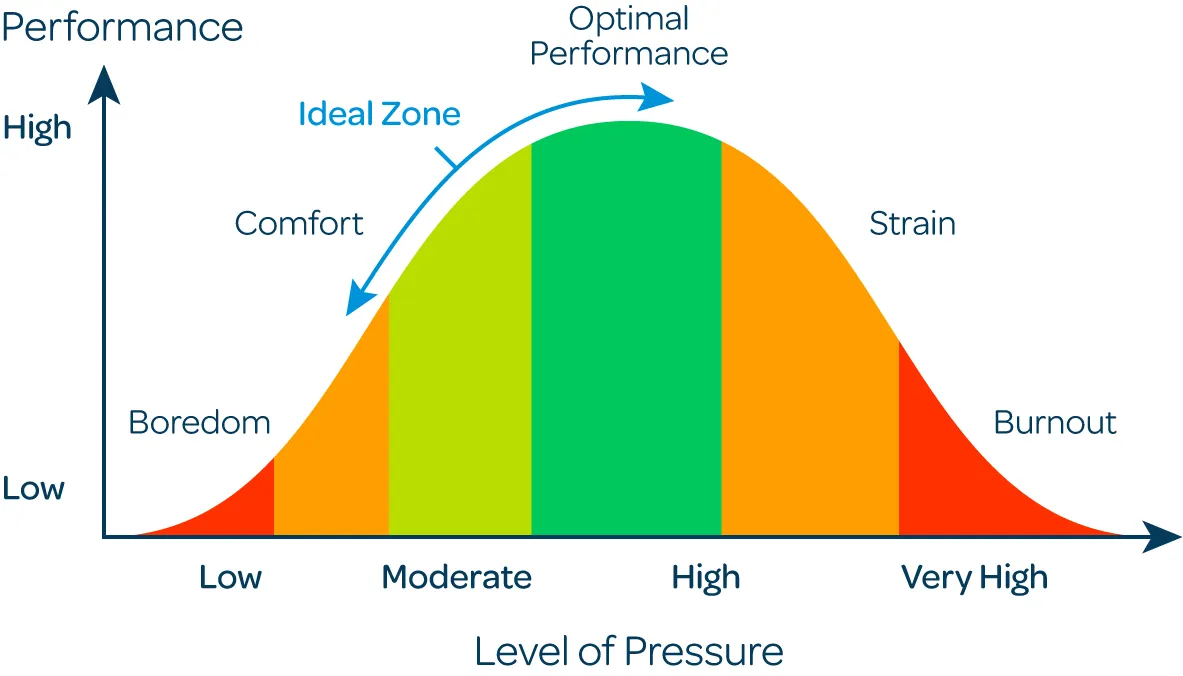
Team Stress Indicators
Team Stress Indicators
TeamLytica's stress curve analysis is a powerful tool for team leaders and members alike. By tracking the stress curve over time, teams can assess the effectiveness of their strategies for stress management and identify areas for improvement.
Understanding how stress impacts team dynamics allows for targeted interventions and the creation of a healthier and more resilient work environment.
Ultimately, by leveraging the stress curve, TeamLytica empowers teams to proactively manage stress, foster collaboration, and achieve their goals with greater efficiency and harmony.


Team Morale
Psychological safety is a fundamental aspect of high-performing teams, and at TeamLytica, we prioritise its understanding and cultivation. Psychological safety refers to an environment where team members feel safe to take risks, express their ideas, and be their authentic selves without fear of judgment or negative consequences.
It creates a space where individuals feel comfortable sharing their opinions, making mistakes, and seeking feedback. By fostering psychological safety within teams, TeamLytica helps unlock the full potential of each member, leading to increased collaboration, innovation, and overall team effectiveness.
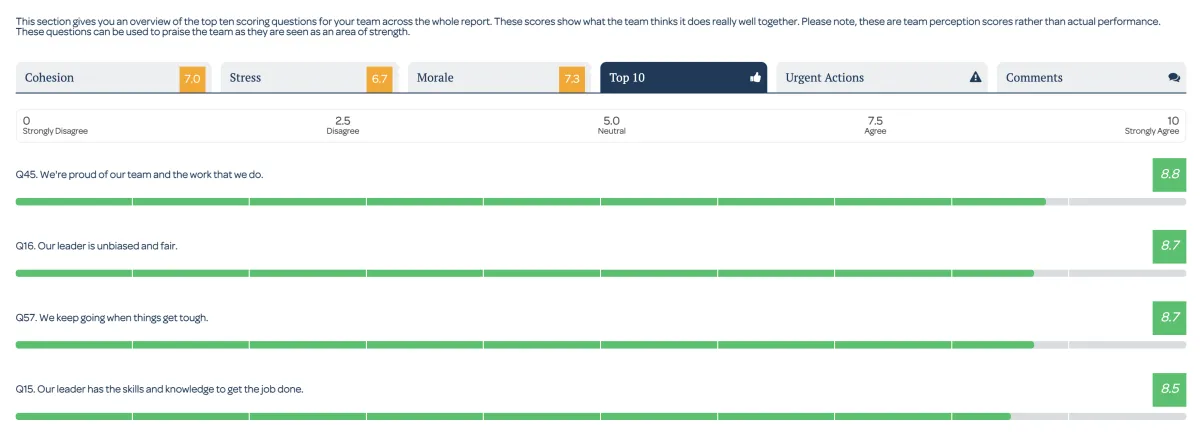
Top Ten Scores
Your Teamlytica report gives you and your team a breakdown of each of the major nine categories within the report. All are colour-coded for ease of use.
The nine categories we score against are based around acknowledged academic, management and team diagnostics. Each question is carefully worded to ensure it can be answered by anyone completing the survey.
Each question is answered via a sliding scale of 1-10 – from ‘Never’ to ‘Always’. Each of the questions and categories are interlinked and inter-dependent and produce a clear and thorough diagnosis of where the team is ‘at’.
Urgent Actions
Urgent Actions
TeamLytica's stress curve analysis is a powerful tool for team leaders and members alike. By tracking the stress curve over time, teams can assess the effectiveness of their strategies for stress management and identify areas for improvement.
Understanding how stress impacts team dynamics allows for targeted interventions and the creation of a healthier and more resilient work environment.
Ultimately, by leveraging the stress curve, TeamLytica empowers teams to proactively manage stress, foster collaboration, and achieve their goals with greater efficiency and harmony.
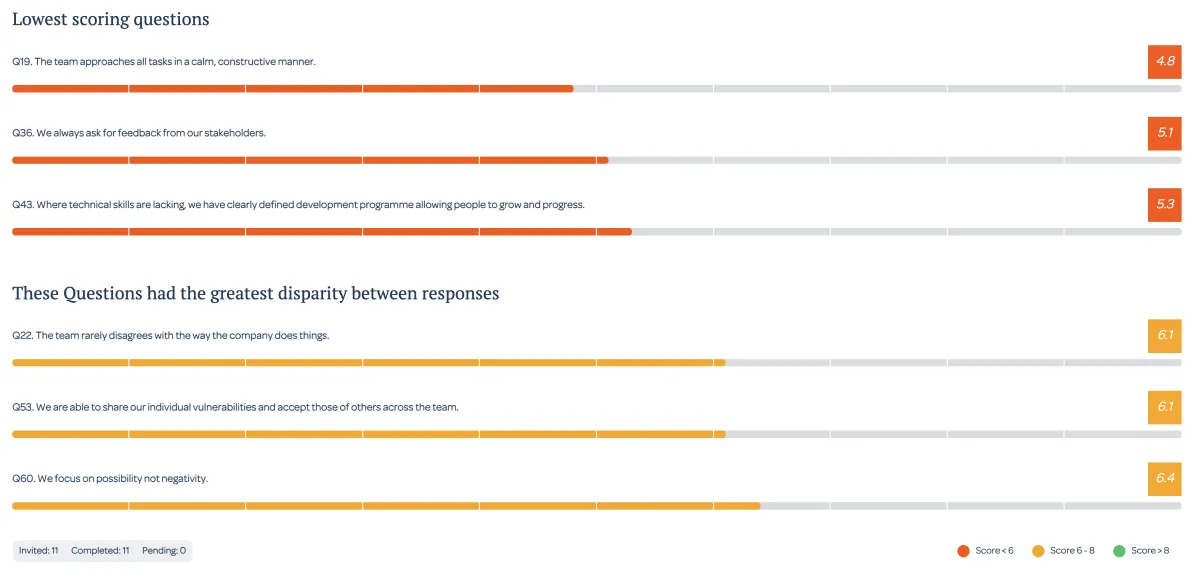
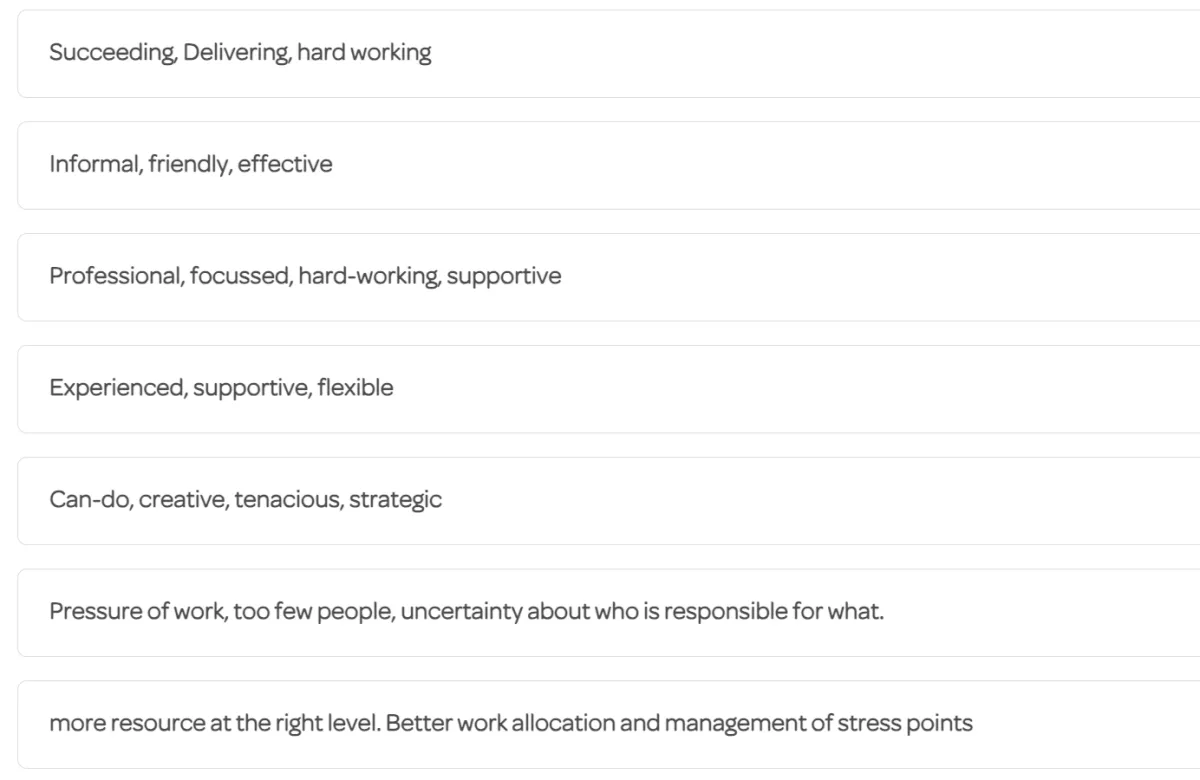
Open Text Responses
Your Teamlytica report gives you and your team a breakdown of each of the major nine categories within the report. All are colour-coded for ease of use.
The nine categories we score against are based around acknowledged academic, management and team diagnostics. Each question is carefully worded to ensure it can be answered by anyone completing the survey.
Each question is answered via a sliding scale of 1-10 – from ‘Never’ to ‘Always’. Each of the questions and categories are interlinked and inter-dependent and produce a clear and thorough diagnosis of where the team is ‘at’.
TeamLytica's Nine Categories
Our unique reporting system gathers information on the nine fundamental categories which are key to a happy, healthy team dynamic.
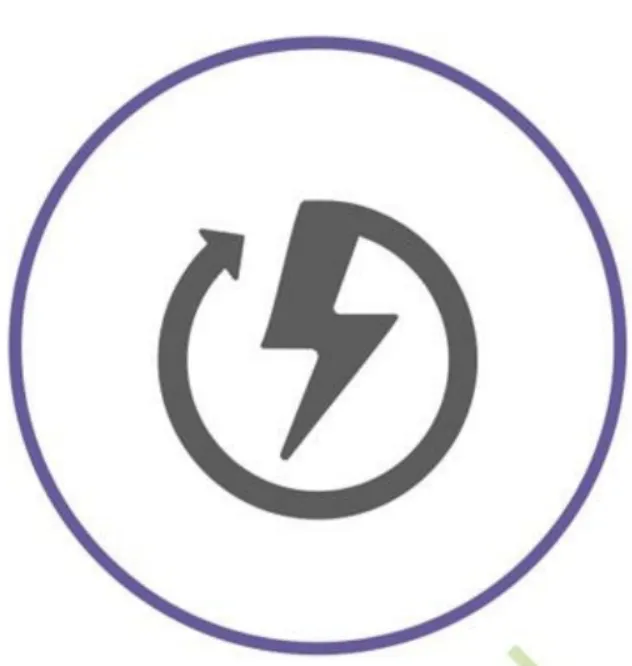
Energy
The Energy category focuses on assessing team members' motivation, enthusiasm, and engagement. It measures their passion for their work and ability to maintain high energy levels. By understanding and optimising team energy, organisations can foster productivity, creativity, and a positive work atmosphere.

Leadership
The Leadership category evaluates the effectiveness of team leaders in guiding and inspiring their members. It assesses leadership qualities, communication skills, decision-making abilities, and their impact on team performance. Effective leadership motivates team members, fosters growth, and contributes to a culture of success.

Capability
The Capability category assesses team members' skills, expertise, and knowledge. It evaluates their collective capabilities to accomplish tasks, solve problems, and meet objectives. By identifying areas for improvement and providing development opportunities, organisations can enhance their team's capabilities and achieve optimal performance.

Trust
Trust is a critical component of successful teamwork. The Trust category measures the level of trust and psychological safety within a team. It evaluates factors such as reliability, transparency, and accountability. By fostering trust, organisations create an environment where team members feel safe to take risks, express opinions, and collaborate effectively.
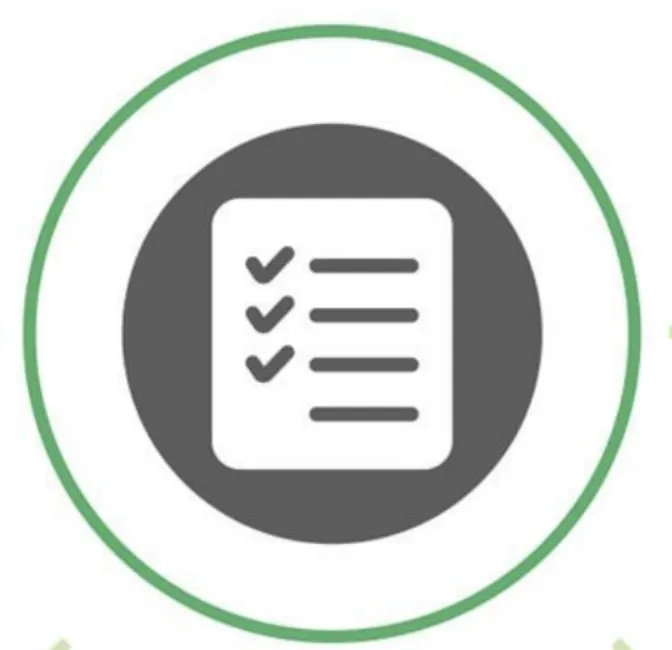
Delivery
The Delivery category assesses a team's ability to meet deadlines, deliver high-quality work, and fulfil commitments. It focuses on project management, efficiency, and consistent results. Organisations can optimise their delivery capabilities by identifying areas of improvement, streamlining processes, and ensuring successful outcomes.
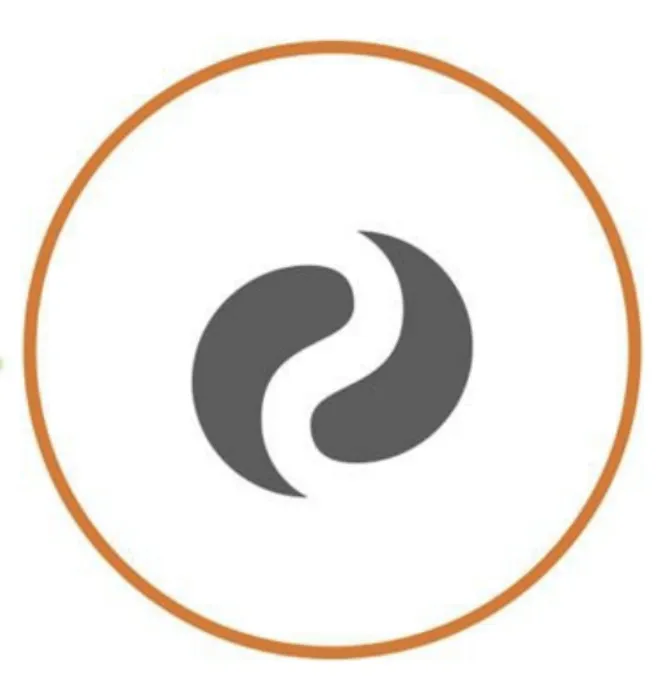
Harmony
The Harmony category evaluates a team's cooperation, communication, and synergy. It assesses how well team members work together, resolve conflicts, and maintain a positive team atmosphere. Organisations can foster collaboration and create a harmonious work environment by nurturing effective team dynamics and encouraging a supportive culture.
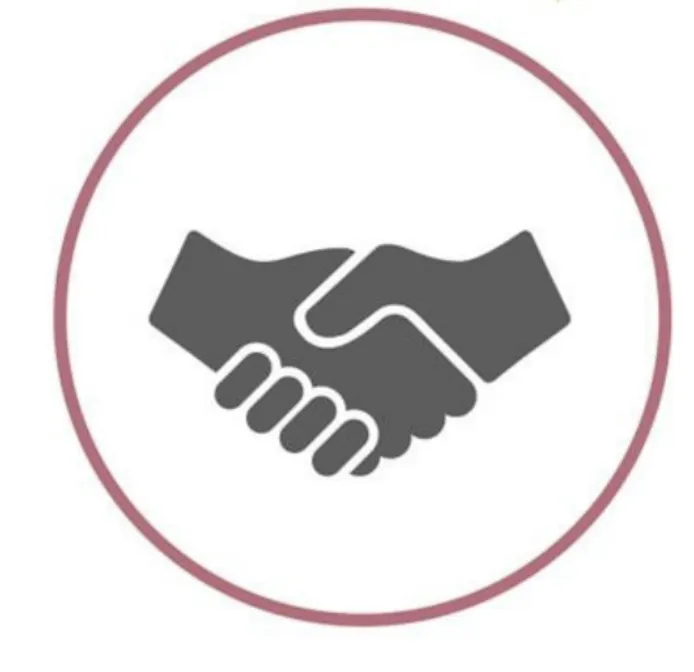
Stakeholders
The Stakeholders category assesses a team's relationship with external parties, such as clients, suppliers or partners. It evaluates how well the team understands stakeholder needs, manages expectations, and communicates effectively. Organisations can strengthen stakeholder relationships and drive success by aligning their efforts to meet these stakeholder requirements.

Accountability
The Accountability category evaluates how well team members take ownership of their responsibilities, meet commitments, and deliver on promises. It assesses personal and collective accountability within the team. Cultivating a culture of accountability fosters reliability, productivity, and overall team success.
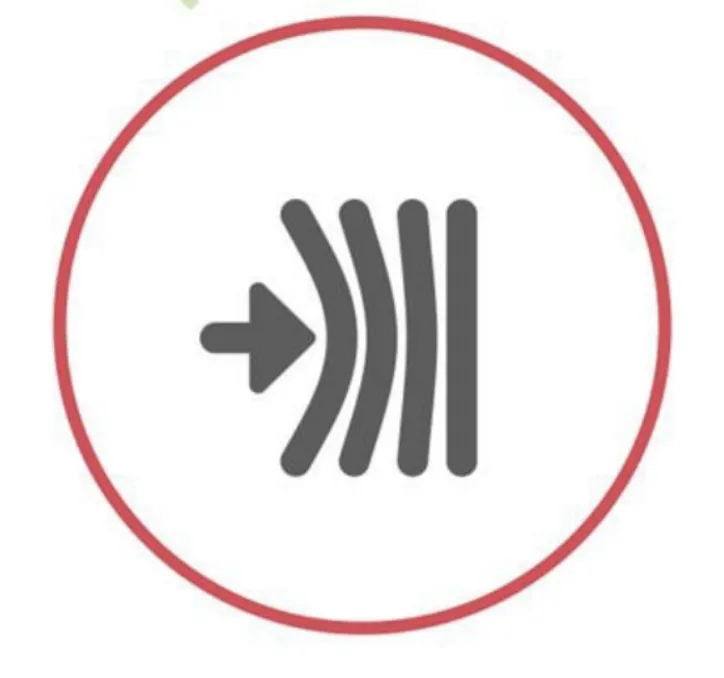
Resilience
Resilience refers to a team's ability to adapt, recover, and thrive in the face of challenges. The Resilience category evaluates how well teams cope with stress, embrace change, and overcome adversity. Organisations can enhance team resilience by providing support, promoting a growth mindset, and equipping teams with the tools to navigate obstacles
Would you like to see a TeamLytica report in action?
Enter your name and email address to receive your free Teamlytica sample report. We will deliver it directly to your Inbox.

Tyrelle Mcleod-Bentley
Director
Soccer Assist
The irony is not lost on us that we recruit and place the next generation of sports stars who all have to excel in teams. The Teamlytica platform has helped us get to a place where we're proud of our own team performances.

Anita Dev
Director
TeamWork ADL
The team reports have really helped our team and given our senior leaders the knowledge we've needed to make effective changes to the way we work and manage.

Steve Chown
Entrepreneurial Innovation Manager
TeamLytica's software has been identified as a valuable tool to check the effectiveness of newly combined teams in the Bank. We are using it to review their progress as the staff become more integrated.

Tyrelle Mcleod-Bentley
Director
Soccer Assist
The irony is not lost on us that we recruit and place the next generation of sports stars who all have to excel in teams. The Teamlytica platform has helped us get to a place where we're proud of our own team performances.

Anita Dev
Director
TeamWork ADL
The team reports have really helped our team and given our senior leaders the knowledge we've needed to make effective changes to the way we work and manage.

Steve Chown
Entrepreneurial Innovation Manager
TeamLytica's software has been identified as a valuable tool to check the effectiveness of newly combined teams in the Bank. We are using it to review their progress as the staff become more integrated.
Accredited Coaches
Only accredited coaches can use TeamLytica.
The training and support you get will ensure you have the right level of knowledge to be able to coach teams as well as individuals. Then our reporting platform gives you a strong structure, providing you with a foundation that you can build on with your own knowledge and experience.
Find out more about our solution:
Keep up to date with our
News & Blogs

NHS & Health Services
NHS & Health Services
Understanding how to get the very best from teams within the NHS and healthcare sector.
The NHS is the largest employer in the UK and faces several unique team and management issues.
NHS spending has increased over recent years, but many people argue that it has not kept pace with need. Management, therefore, has had to find ways to economise, making better use of fewer resources.
The NHS faces several critical issues; primarily incentives and accountability. The financial structure of the organisation often means that it can be challenging to bring teams together to achieve shared goals. Managers, therefore, need robust tools at their disposal to deliver effective health teams, centred on patient care.
TeamLytica is a platform that NHS managers can use to discover why some teams appear to have high performance than others. It also identifies problems and offers actionable managerial insights to resolve them.
Using KITE – K – Knowledge, I – Insights, T – Training, E – Empowerment.
The way that the platform works is simple. Workers receive the KITE – knowledge, insight, training and empowerment – questionnaire and answer 54 questions covering various aspects of team performance. The TeamLytica platform then collates the data generated to produce a 28-page report, detailing the responses of the questionnaire and critical insights for management. Managers can then use this information combined with intelligent insights to boost the performance of their team.
Every report comes with a team summary: a high-level overview of the performance of your teams and management over nine critical domains: leadership, delivery, trust, capability, energy, harmony, stakeholders, accountability and resilience.
In the NHS, delivering on each of these domains is essential for ensuring a functional team that serves patients interests. Trust is crucial in the health setting, for instance. Workers need to feel confident about approaching managers with issues, especially those relating to patient wellbeing.
Resilience is important too. Managers need to be able to craft teams that can withstand budget pressures and still deliver a high level of patient care. TeamLytica’s metrics provide you with insight into how well your organisation is dealing with these pressures and the degree to which members are relying on others to bear the load.
We aim to do things a little differently at TeamLytica – we’re here to help.
Some NHS teams work much more effectively than others, but the reasons can remain invisible to managers. TeamLytica’s powerful analytics platform provides vital insights into why this might be the case by comparing the results of one team’s KITE survey to that of another. Both, for instance, might score equally well on several of the domains, but the underperforming team might lag in specific areas. Managers can use these insights to take actionable steps to improve team performance.
Managers in the NHS are under enormous pressure to make better use of taxpayer resources and deliver a high quality of care. Part of the solution to the current funding environment is to build better teams. The more cohesive your operation, the better you can serve patients, and the higher the quality of the overall service.
With TeamLytica, you can get immediate insights into why your teams might not be performing as they should. With more than nine domains of interest, you’re bound to find where the problem lies.












